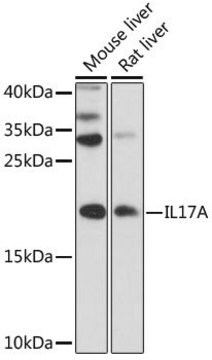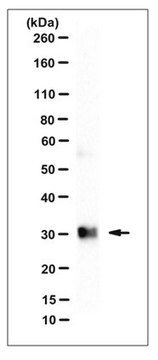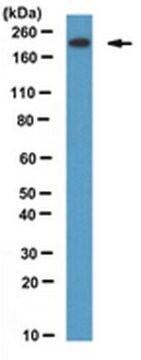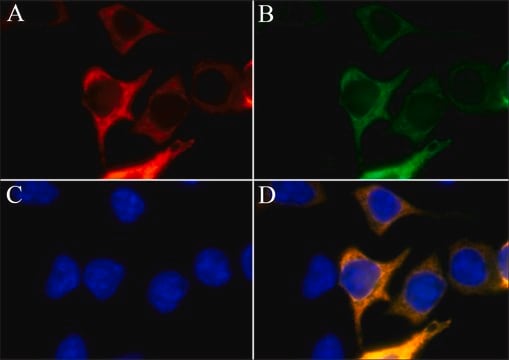MABS274
Anti-LRP6, clone A59, Ectodomain Antibody
clone A59, from mouse
Sinónimos:
Low-density lipoprotein receptor-related protein 6, LRP-6
About This Item
Productos recomendados
biological source
mouse
Quality Level
antibody form
purified immunoglobulin
antibody product type
primary antibodies
clone
A59, monoclonal
species reactivity
human
technique(s)
flow cytometry: suitable
immunocytochemistry: suitable
immunoprecipitation (IP): suitable
isotype
IgG1κ
NCBI accession no.
UniProt accession no.
shipped in
wet ice
target post-translational modification
unmodified
Gene Information
human ... LRP6(4040)
General description
Immunogen
Application
Immunoprecipitation Analysis: A representative lot from an independent laboratory immunoprecipitated LRP6, Ectodomain from Wnt3a-treated HEK293T cell lysate (Yasui, N., et al. (2010). J Immunol Methods. 352(1-2):153-160.).
Immunocytochemistry Analysis: A representative lot from an independent laboratory detected LRP6, Ectodomain in HeLa S3 cells (Yasui, N., et al. (2010). J Immunol Methods. 352(1-2):153-160.).
Signaling
Insulin/Energy Signaling
Quality
Flow Cytometry Analysis: 2 µg of this antibody detected LRP6, Ectodomain in 1X10E6 HEK293 cells.
Target description
Physical form
Storage and Stability
Other Notes
Disclaimer
¿No encuentra el producto adecuado?
Pruebe nuestro Herramienta de selección de productos.
Storage Class
12 - Non Combustible Liquids
wgk_germany
WGK 1
flash_point_f
Not applicable
flash_point_c
Not applicable
Certificados de análisis (COA)
Busque Certificados de análisis (COA) introduciendo el número de lote del producto. Los números de lote se encuentran en la etiqueta del producto después de las palabras «Lot» o «Batch»
¿Ya tiene este producto?
Encuentre la documentación para los productos que ha comprado recientemente en la Biblioteca de documentos.
Nuestro equipo de científicos tiene experiencia en todas las áreas de investigación: Ciencias de la vida, Ciencia de los materiales, Síntesis química, Cromatografía, Analítica y muchas otras.
Póngase en contacto con el Servicio técnico








